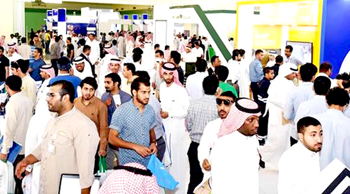Jeddah, Jun 9: Despite increased spending on education and training, the private sector was unable to provide sufficient jobs to absorb skilled national employees with high levels of education.

The ministry’s report indicated that Saudization increased in 2014 in the water, manufacturing, financial activities, telecommunications, and the wholesale and retail sectors, but rates declined in the electricity, mining, real estate, agriculture, health, transport, and hotel and restaurants sectors.
Out of a population of about 30.7 million people, including 20.7 million Saudi nationals and more than 10 million non-Saudis, an estimated 13.5 million Saudis are of official working age. More than 237,000 men and women entered the work force in 2014, while about 99,000 exited the same year, according to the report.
This growth in the proportion of workers entering the labor market poses demographic pressures, as it is not commensurate with the number of jobs available in the economy, the report revealed.
Furthermore, the rate of growth has accelerated in private sector employment in 2014, as its growth rate amounted to 14.18 percent as compared to13.5 percent the previous year. Government sector employment has grown at a rate of 3.28 percent in 2014, as compared with 6.4 percent in 2013.
However, employment growth in the private sector did not lead to a reduction in the unemployment rate among Saudis, as unemployment in 2014 remained at 11.7 percent.
Meanwhile, the number of Saudis unwilling to work in 2014 increased by 297 percent due mainly to the reluctance of young Saudis to take on unskilled jobs that are offered by companies in the private sector, which are not commensurate with their qualifications and are not suitable for those with a university education.
The report also revealed that 88 percent of new entrants in the private sector labor market in 2014 are male, while only 12 percent were female. The unemployment rate is higher among females, at 32.8 percent, while unemployment for males registered 5.9 percent in 2014.
The issue of unemployment in the Saudi economy is a sensitive and controversial matter of public opinion. The government has prioritized the issue and has launched multiple strategies to reform the labor market and increase the employment of Saudis in the private sector, as well as increase productivity.






Comments
Add new comment